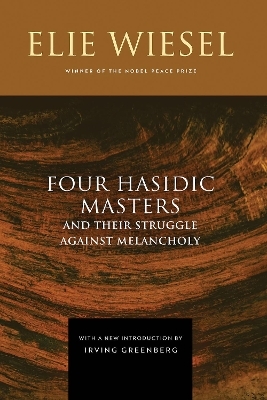
Four Hasidic Masters and Their Struggle against Melancholy
University of Notre Dame Press (Verlag)
978-0-268-20727-4 (ISBN)
In Four Hasidic Masters and Their Struggle against Melancholy, Jewish author, philosopher, and humanist Elie Wiesel presents the stories of four Hasidic masters, framing their biographies in the context of his own life, with direct attention to their premonitions of the tragedy of the Holocaust. These four leaders—Rebbe Pinhas of Koretz, Rebbe Barukh of Medzebozh, the Holy Seer of Lublin, and Rebbe Naphtali of Ropshitz—are each charismatic and important figures in Eastern European Hasidism. Through careful study and consideration, Wiesel shows how each of these men were human, fallible, and susceptible to anger, melancholy, and despair. We are invited to truly understand their work both as religious figures studying and pursuing the divine and as humans trying their best to survive in a world rampant with pain and suffering.
This new edition of Four Hasidic Masters, originally published in 1978, includes a new text design, cover, the original foreword by Theodore M. Hesburgh, C.S.C., and a new introduction by Rabbi Irving Greenberg, introducing Wiesel’s work to a new generation of readers.
Elie Wiesel (1928–2016) was the Andrew W. Mellon Professor in the Humanities at Boston University. He is the author of more than forty books, several of which have won international awards. His work on behalf of human rights and world peace earned Wiesel the Nobel Peace Prize (1986), the Presidential Medal of Freedom, and the United States Congressional Gold Medal, among many other honors. Rabbi Irving (Yitz) Greenberg is an American scholar, author, and rabbi. A leading Jewish thinker, Greenberg has written extensively on post-Holocaust Jewish religious thought, Jewish-Christian relations, pluralism, and the ethics of Jewish power. Theodore M. Hesburgh, C.S.C. (1917–2015) served as the president of the University of Notre Dame for thirty-five years. He was one of the most influential forces in American higher education and one of the most respected voices in the Catholic Church.
Foreword by Theodore M. Hesburgh, C.S.C.
Introduction by Irving Greenberg
1. Rebbe Pinhas of Koretz
2. Rebbe Barukh of Medzebozh
3. The Holy Seer of Lublin
4. Rebbe Naphtali of Ropshitz
Background Notes
Synchronology
| Erscheinungsdatum | 17.10.2023 |
|---|---|
| Einführung | Irving Greenberg |
| Vorwort | Theodore M. Hesburgh |
| Zusatzinfo | 1 Maps; 1 Tables, black and white; 1 Illustrations, black and white |
| Verlagsort | Notre Dame IN |
| Sprache | englisch |
| Maße | 140 x 216 mm |
| Themenwelt | Geisteswissenschaften ► Geschichte ► Regional- / Ländergeschichte |
| Geschichte ► Teilgebiete der Geschichte ► Kulturgeschichte | |
| Geisteswissenschaften ► Religion / Theologie ► Judentum | |
| ISBN-10 | 0-268-20727-5 / 0268207275 |
| ISBN-13 | 978-0-268-20727-4 / 9780268207274 |
| Zustand | Neuware |
| Haben Sie eine Frage zum Produkt? |
aus dem Bereich


